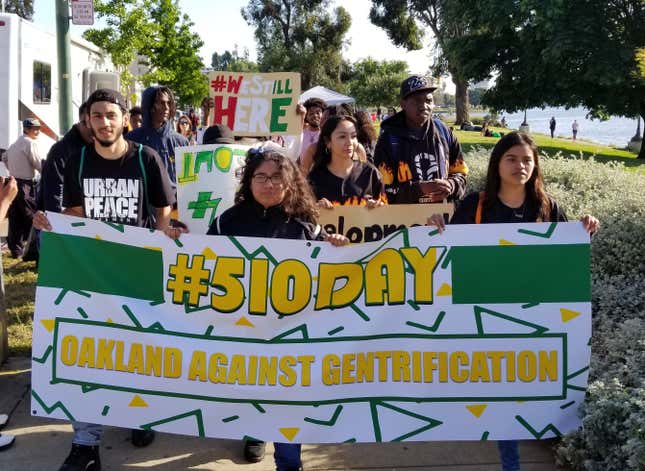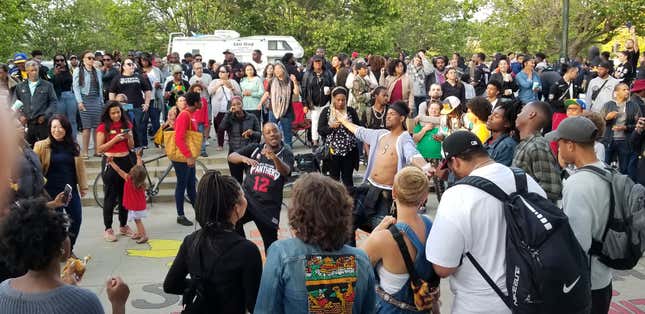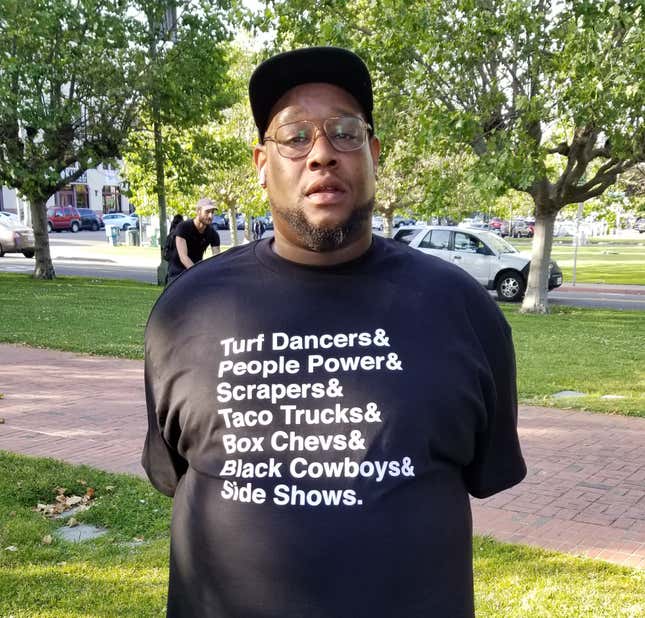
With the soul of the city at stake, there’s a civil war brewing in Oakland, Calif.
Movies like Blindspotting and the Boots Riley-helmed Sorry to Bother You gave us a glimpse into this escalating feud, but there’s no better example of the conflict raging than the infamous BBQ Becky debacle, which occurred almost a year ago to the day.
Last Spring, the world’s worst—and whitest—super heroine called the police on two black men for—wait for it—barbecuing at Oakland’s Lake Merritt. She accosted them with claims of it being “her park.” She deemed their decision to spend their Thursday afternoon grilling as “illegal,” and she heckled them with all too familiar coded language like “you guys shouldn’t be here.”
And then she called the cops on them. For barbecuing.
Her actions ignited a firestorm of outrage as every publication, news outlet and social media platform exploded with fervor, either bemoaning the perils of everyday racism or deconstructing its endless manifestations. But for residents of Oakland, it was indicative of how the once looming threat of gentrification had evolved into a full-blown contagion.
And it was time to do something about it.
So this year, as with last, in celebration of Oakland’s 510 Day—which falls on May 10, its name a nod to its 510 area code—organizations like the Urban Peace Movement, Communities United for Restorative Youth Justice, AYPAL and the East Oakland Collective joined forces to do exactly that. They pooled their resources, tapped into their various networks and planted their flag in the sand to revolt against the continuous transformation of a city they no longer recognize.
In all, it was a transformative and powerful event that The Root was privileged to bear witness to. It kicked off with an impassioned youth-led rally.
“The rally is basically battling gentrification and displacement,” Urban Peace Movement community organizer Leo Mercer, who lead the rally, said. “It’s a representation for people who’ve been out here and made their living out here. It’s just to tell gentrifiers we’re still here. We’re still thriving and we’re still demanding our space up in here.”
Forever committed to that cause, Mercer—who’s also an integral member of the Mercer Brotherhood—was unapologetic in addressing these issues while leading a march to the event with chants of: “They can raise our rent, but they can’t kick us out!” and “Get up! Get down! There’s some people moving in your town!”
He also commanded low riders and other cars passing by to honk if they too were against gentrification, which many were more than willing to do, drowning out a smiling Mercer with blaring car horns and exuberant cheers of “We still here!”
When asked how gentrification has ravaged the Oakland he once he knew, Mercer was painfully honest.
“You get scared when you see a Starbucks,” he admitted. “You get scared when you see a Peet’s. Because you know it’s about to come with a whole bunch of buildings that you ain’t gonna know nobody in.”
He added, “At the end of the day, it should be a situation where people are sharing space instead of taking it over.”
When the march concluded and the actual event began, there was an overwhelming sense of both paranoia and pride as dozens and dozens of Oakland residents draped in Steph Curry jerseys and other 510-inspired garb poured in. If America has taught us anything, it’s that an oasis of blackness is far too often perceived as a threat.
“Better not be none of that BBQ Becky bullshit today,” an unnamed vendor selling jewelry said. “They always fucking with us.”
But thankfully, it was a day full of purpose and promise, free and clear of bullshit. The crowd was as massive as it was diverse, with Latinos, Asians, and even white folks sprinkled in, as The Town’s own legendary DJ Fuze—immortalized for his run with 90’s outfit Digital Underground—spun everything from local mainstays like E-40’s “Sideways,” to your auntie’s aphrodisiac of choice, Luther Vandross, to afrobeat bangers like Tekno’s “Go.”

And while the night was peppered with plenty of political activism, there was dancing. A lot of damn dancing. Because contrary to popular belief, resistance isn’t monolithic.
“Dancing and music are part of the resistance,” Nicole Lee, the executive director of Urban Peace Movement, told Fox KTVU.
Which means the “Cupid Shuffle,” “Swag Surf” and “Electric Slide” made guest appearances as well—for the culture, of course.
“Oakland is a place with layers of culture and beautiful people from all backgrounds and ethnicities,” Candida Bell, a pillar of the neighboring Piedmont community, said. “510 Day is a day to celebrate all of that and everything that makes Oakland hella awesome.”
That’s the thing about Oakland too. “Hella” and “fo sho” are as pervasive as the ever-increasing gentrification.
“It’s hard to see the places that we’re used to being at being criminalized,” Leon Sykes, co-creator of 510 Day, said. “It’s hard to see we’re unwelcome in places we helped to cultivate.”
He added, “You can’t be from Oakland, you can only be a part of it. You put the work in, you show the love, and if you’re invested in the community you’re welcome.”

Sykes, who works in tech, said the idea for 510 Day was rooted in solidarity.
“So it started out, two of the homies were talking about how [San Fransisco] has a 415 Day. And I was like ‘We should do something in solidarity with that.’ So it started out as a way for us to address the mass gentrification that’s been happening. So four years ago, we started out at the same time they were having all these signs out here saying it was illegal to barbecue at the lake and play music at the lake. So I said, ‘We’re gonna go out on May 10th and do everything they said we can’t do,’” he said. “At first it was like a middle finger to everybody trying to tell us how to live in our city, to us really growing it into a movement of activists, youth, all community folks coming together to really put in the work. This is all community stuff.”
And with an impromptu appearance by hometown hero Mistah F.A.B., spirited dance battles and games of Jenga, the array of vendors selling everything from chicken wings to Black Riders newspapers and even a giant projection screen on hand so that attendees wouldn’t miss their beloved Golden State Warriors play against their nemesis, the Houston Rockets, it was unquestionably a community effort.
It was Oakland.
“I got homies that are drug dealers that are like, ‘How do we make sure this works?’” Sykes said. “I got folks that are working in the hills, making a lot of money, asking ‘How can we help out?’”
And with another successful 510 Day under their belt, organizers plan to take things up a notch this summer with a blockbuster BBQ scheduled for July 21. They’ve recently launched a GoFundMe campaign in order to offset its exorbitant costs.
But in the interim, with its rich history of community activism, don’t think that Oakland residents will be waiting idly by, resting on their laurels.
“Is this for me?” a white woman said, gawking at signs that read “Oakland is broken without us” and “Development for the people, not profit.”
“If the shoe fits,” one of the organizers barked back. “We still here!”

